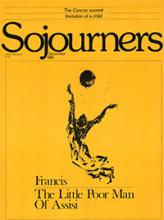Francis of Assisi stands as a symbol that peacemaking is a thinkable endeavor even in a war-wracked world such as ours. Doing so, however, requires us to exchange the world's wisdom for divine foolishness. The world will not understand.
Early on, Francis did not understand either. Growing up in a bellicose era, his aspirations fitted the temper of the times. He bedecked himself in human armor and fought with human weapons. In time, however, he experienced a conversion. Thenceforth he no longer battled flesh and blood with physical weapons. He fought instead against war and its causes with charity and humility and persuasion.
Francis' world, so like our own, suffered interminable pangs of violence and war. He grew up in a home whose walls were decorated with implements of war and whose rooms resounded with tales of knightly daring. Francis the child, doted on by a rich and indulgent father, played the war games children his age played. Francis the youth, therefore, dutifully donned resplendent regalia and marched off to war when the powerful Perugian militia threatened. Unhorsed and taken captive, he spent a year or more in prison. But when Assisians mounted a new campaign, against Apulia, the undaunted Francis prepared to join the battle.
Here, however, the bubble burst. A lengthy illness and now perhaps a dream the night before or the sight of a poor knight in tatters pricked it. Whatever the causes, the erstwhile knight dismounted, undressed, and gave horse, armor, and all to the poverello, and traipsed off to the fields to pray and to dream about another kind of warfare--one fought not with human arms but with love and persuasion.
Read the Full Article

